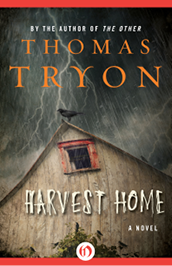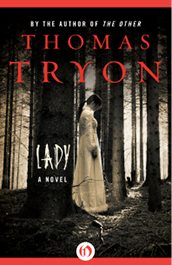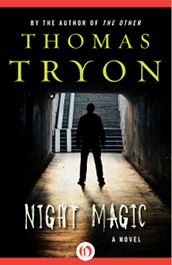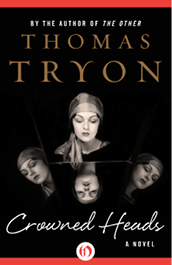Crowned Heads (59 page)
Authors: Thomas Tryon
He rose as they now approached across the dining patio. Willie looked dapper in a light-colored striped business suit with a vest, and two-tone shoes. Bee wore a flossy print, a hat not only with net but a feather as well, and dark glasses with white frames. A brightly contrasting handkerchief was attached to her lapel, waitress style. Her bosom, squashed upward and together so it looked like a baby’s bottom, was more emblazoned with scatter pins than a general’s with insignia. She wore gloves and earrings and a necklace. She wore several bracelets. Barry had the impulse to tell her to go home and take off any three things.
She said how exciting it all was, waiting for Willie to pull out her chair and seat her. She took up a good deal of room at the table, laying her things about as she began talking—her pocketbook, a pack of Kleenex, and several parcels. One of these was a zippered cloth case of watered silk. She showed Barry what it contained: an ornate oval hand mirror. After lunch Willie was driving her to Laguna to sit for her portrait; a young man she’d discovered and who had, she declared, a lot of talent. The mirror would be resting in her hand in the picture. It had once belonged to Catherine de’ Medici, and was the work of Cellini; Fedora had given it to Willie. This, as Bee confided
sotto voce,
was not the original, however, but merely a cheap copy made as a prop for one of Fedora’s lesser successes,
The Mirror.
The real one was safeguarded in a vault in the Bank of America, while this counterfeit was kept in a wall safe to fool potential burglars.
The waiter brought menus, orders were taken. Barry wanted only a salad and Willie suggested the Niçoise. The ingredients were wheeled out in a bowl on a cart—tuna fish, black olives, hard-boiled eggs, filet of anchovy, small cold potatoes. The butter lettuce was the palest green, with yellow and white hearts, and Willie had made sure the leaves were individually patted dry after being washed, and saw to the elaborate preparation of the vinaigrette himself. The trick, you see, he said, was a pinch or two of dry mustard, and one or two of sugar.
It was during the mixing of the dressing that Bee Marsh, subsiding at last, permitted Willie to speak at length. He was in a reminiscing mood—he was commencing his memoirs, to be called “Salad Days”—and he lingered lovingly over earlier times, more pleasant ones, when they had called Twentieth Century-Fox “the country club,” and a working star thought nothing of taking off in the middle of the afternoon for a golf game; when the San Fernando Valley had been walnut groves and Santa Monica rice paddies; when there had been no freeways and people were driven by their liveried chauffeurs in Duesenbergs, when there had been no smog and the sun shone bright and unceasingly, when lawns stayed green without benefit of sprinkling systems, when polo matches were played at Will Rogers’s ranch and Gable danced with Lombard at the Trocadero.
Looking about him, Barry noticed several recognizable industry figures at other tables. Among them were a producer, a columnist, and several actresses of note. It happened that at the opposite end of the arbor sat an elderly woman in navy blue, talking quietly with a companion. Willie had singled her out as someone whose name Barry knew, but whom he had never seen in pictures. She did not wear dark glasses; she was in the shade and there was no need of disguise. Nobody recognized her, with the exception of Willie, who had pointed her out, and few would have remembered her. She had appeared in several early films for Derougemont, and her name had been in lights above the title on theater marquees all over the country. Her pictures were mostly forgettable, and though her name had been set in a star on Hollywood Boulevard, no one paid attention to it as they walked over it. Now no heads even turned to glance at her: one of the Talmadges, and formerly one of the biggest stars in movies.
Although neither she nor Barry nor Willie Marsh realized it, the day of Hollywood was already nearing its end. The mastodon was groping its way to the boneyard to die. The old guard was fearful of becoming the rear guard. A Presence lurked in town. Television studios had been built, NBC in Burbank, CBS at Beverly and Fairfax. Long a tradition in the courtyard behind Paramount’s Marathon Street gate, the goldfish pond had been torn out to make room for a parking lot. Mayer was gone from MGM, Zanuck was reported leaving Fox for independent production, Jack Warner was said to be contemplating the sale of his studio. De Mille was then in the process of cutting his last movie. None of this, however, was discussed. What was talked about was the old, forgotten actress. Signs of the times, Willie said. Bee protested. No, she maintained adamantly, once a star, always a star. For once, Willie disagreed with his mother, and then recounted to Barry a story which he hoped proved his point.
It had been back in the late thirties, before Fedora had left Hollywood prior to the war. She had completed her last film and one Sunday she called Willie and asked him to take her for a drive. He picked her up at her house in Pacific Palisades and they drove south along the Coast Highway. It was a gray, foggy day, the sort of weather Southern California often sees in June, and there were few people on the beaches. When they got to Santa Monica, Fedora said she wanted to stop and have a picnic on the sand. They parked and went into a delicatessen, Tashkent’s Select Kosher Deli, as it was called. After examining the glass meat cases, Fedora ordered bagel sandwiches with lox and cream cheese, hard-boiled eggs, and soda pop, to go. Opening two root beers, the proprietress, Mrs. Tashkent, peered up through her green celluloid eyeshade at Fedora and said, “Say, ain’t chou a movie stah?” Fedora shook her head; no movie stars today. “Shuah, you’re a movie stah,” persisted Mrs. Tashkent, coming around the counter for a closer view. “I know you’re a movie stah. Ain’t chou?” Again shaking her head, Fedora retreated to a rack of magazines, waiting for Willie to bring the food. Little Mrs. Tashkent was not to be put off; she eyed Fedora from under her eyeshade, ruminatively tapping a fingernail against a front tooth, trying to decide who this “movie star” might be. “Listen, mistuh,” she asked Willie, “she’s a movie stah, isn’t she? I know I’ve seen her, I know I have. Seen her in … pictures.”
“I shan’t tell you,” Willie said sweetly, “unless you pay me a dollar.”
“A dolluh?” Mrs. Tashkent was shocked. “A dolluh’s a lotta money these days for just a movie stah.” She peered closer at Fedora and as though reading the riddle of the Sphinx, she asked again, “Please, ain’t chou a movie stah?”
“Yes”—Fedora finally acquiesced—“I’m a movie star.” As if to say: Yes, dear little Mrs. Tashkent lady, for you I’ll be a movie star. If my being a movie star makes you happy on this gloomy June day, I’m a movie star.
“Yeah,” said Mrs. Tashkent dubiously, “but are you a
poimanent
movie stah?”
Laughing, Fedora went out, and as Willie followed her, Mrs. Tashkent touched his arm confidentially and leaned up to him. “No kiddin’, mistuh, what’s her name?” Willie whispered in her ear; Mrs. Tashkent nodded, his words at last satisfying her. “I thought it was.” Willie went out, and before the screen door closed he could hear Mrs. Tashkent shouting to the rear of the store, “Irving, guess who’s just in fa’ lox and bagels—Verree Teasdale!”
“And don’t forget me,” Willie called through the screening, “Adolphe Menjou!”
They took their picnic onto the fogged-in beach, where they walked along, Willie waiting for Fedora to decide on a spot, which turned out to be the farthest point from any visible object—from the lifeguard tower, the trash can, the street, the pier. The sand was flat, moist, well packed. There were no footprints other than their own trail behind, and those of the sea gulls. The wide strand had a clean, just-raked look, pristine, unmarred by litter, and not another soul was to be seen. They could actually make out the individual silvery particles forming the fog; they touched their skin in minute glistening globules, cold and damply soothing. From the car Fedora had brought a light lap robe, and in a suddenly capricious mood she flung it around her head and instantly became a peasant woman, stretching out her hand and groaning, “I
hong
ree. Plees, you geeve oldt lady foodt, yais?” The great face became Duse, became Bernhardt, became the movie Fedora. She flung herself against Willie, twining her arms about him, embracing him, then arching away with the impassioned expression of the classic tragedienne, breathless, pulsating, panting, eyebrows scooped, yearning at an imaginary adoring audience, accepting its homage, the entire history of acting written across her brow. And in men’s trousers, too; what a sight, thought Willie Marsh.
Then they heard it, the far-off sound of a military band rising above the waves. Beyond the pier the fog had rolled in so they could see scarcely twenty feet in front of them, but, unmistakably, there came the beat of martial music. Fedora seized Willie’s hand and dragged him along, running across the beach to the street, following the sounds, brass and glockenspiel, drums and fifes, tubas, then they stopped, astonished, as out of the swirling fog came a full marching band, high school kids in outfits like movie theater ushers, their shining instruments playing “Stars and Stripes Forever.” A befrogged drum major in his furry shako bowed to Fedora and Willie; he was followed by a pretty drum majorette, in short skirt, with shapely thighs, full breasts, and blond hair. A pretty thing, the vision of the all-American girl, with red lips and white teeth and a confectionery smile, as she spun her silver baton with its white rubber-tipped ends. Up in the air the baton flashed, and when it came down Fedora darted to catch it, then twirled it before her, strutting spectacularly, doing high kicks with her long legs, back arched, singing with a heavy Russian accent, “Oh, the mon-kee wrapped hees tail ar-round the flag-po-ole,” and with a mighty toss sending the baton into the air again, out of sight into the fog, waiting, looking for its return, the brass section ducking it, the French horns scattering, the percussionists shielding their heads against its descent. It dropped and the drum majorette ran to retrieve it. “Hurry up, Cookie,” someone called from the departing column, and the girl smiled and waved, then ran to take up her position again. Fedora watched them go, her face alight like a twelve-year-old’s, breathless from her act as the band disappeared again into the blurred white and the music faded away in the distance.
“Such a pr-retty girl,” she said of the blond majorette. “You know—she really ought to be in the movies.”
Thomas Tryon (1926–1991), actor turned author, made his bestselling debut with
The Other
(1971), which spent nearly six months on the
New York Times
bestseller list and allowed him to quit acting for good; a film adaptation, with a screenplay by Tryon and directed by Robert Mulligan, appeared in 1972. Tryon wrote two more novels set in the fictional Pequot Landing of
The Other
—
Harvest Home
(1973) and
Lady
(1974).
Crowned Heads
(1976) detailed the lives of four fictional film stars and
All That Glitters
(1986) explored the dark side of the golden age of Hollywood.
Night Magic
(published posthumously in 1995) was a modern-day retelling of
The Sorcerer’s Apprentice
.
All rights reserved, including without limitation the right to reproduce this ebook or any portion thereof in any form or by any means, whether electronic or mechanical, now known or hereinafter invented, without the express written permission of the publisher.
This is a work of fiction. Names, characters, places, events, and incidents either are the product of the author’s imagination or are used fictitiously. Any resemblance to actual persons, living or dead, businesses, companies, events, or locales is entirely coincidental.
Grateful acknowledgement is made to Warner Bros. Music for permission to reprint lines of lyrics from “Blues in the Night,” lyrics by Johnny Mercer music by Harold Arlen. Copyright © 1941 by Warner Bros., Inc., copyright renewed. Used by permission. All rights reserved.
Chappell & Co., Inc.: Lyrics on page 91 from “LOOKIE, LOOKIE, HERE COMES COOKIE.” Copyright © 1935 by DeSylva, Brown & Henderson, Inc. Copyright renewed, assigned to Chappell & Co., Inc. International Copyright Secured. All rights reserved. Used by permission.
ABC Music Corp.: Lyrics on page 322 from “California Dreamin’” by M. Gilliam and J. Phillips. Copyright © 1965 by American Broadcasting Music Corp., Inc. Used by permission. All rights reserved.
Copyright © 1976 by Thomas Tryon
Cover design by Kathleen Lynch
978-1-4804-4231-3
This edition published in 2013 by Open Road Integrated Media, Inc.
345 Hudson Street
New York, NY 10014






